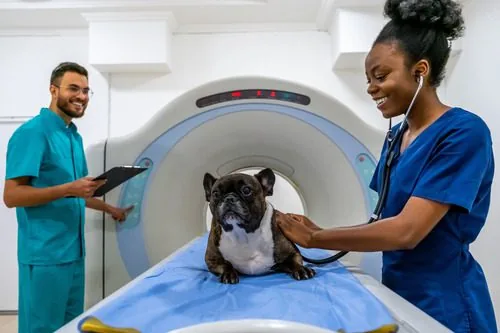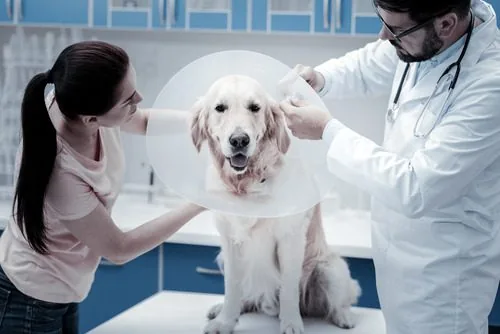Neurological Disorders in Dogs
Watching your dog suddenly stumble, tremble, or behave in an unusual way can be alarming. While not every odd behavior signals a serious problem, some signs may point to something deeper such as a neurological disorder. Neurological disorders in dogs can affect movement, behavior, and basic body functions, often without warning. This blog explores the most common types of neurological disorders in dogs, the signs pet owners should look for, how these conditions are diagnosed, and the kinds of treatments that may be recommended. If you’ve noticed changes in your dog that seem out of the ordinary, Veterinary Healthcare Associates in Winter Haven, FL, is here to support you every step of the way. Call us at (863) 324-3340 to schedule an evaluation.

What Are Neurological Disorders in Dogs?
Neurological disorders in dogs affect the central or peripheral nervous systems, which include the brain, spinal cord, and nerves. These systems control everything from movement and coordination to behavior and reflexes. When something interferes with how these systems function, symptoms can vary widely depending on the location and severity of the problem.
Some neurological conditions are inherited, while others result from injury, infection, tumors, or other diseases. Because the nervous system plays such a broad role in your dog’s well-being, even small changes in behavior or mobility may signal a neurological issue. It’s important to track symptoms and seek veterinary care for further evaluation.
Common Types of Neurological Disorders in Dogs
There are many different neurological disorders in dogs, each with its own set of symptoms and challenges. Below are several of the most frequently diagnosed conditions.
Intervertebral Disc Disease (IVDD)
IVDD occurs when the discs between a dog’s vertebrae rupture or degenerate, putting pressure on the spinal cord. This condition can cause pain, weakness, or even paralysis. It’s more common in breeds with long backs like Dachshunds, Corgis, and Beagles. Symptoms may appear suddenly or develop gradually over time. Treatment varies depending on severity. Mild cases may respond to rest and anti-inflammatory medications. More severe cases could require surgery to relieve pressure on the spinal cord.
Seizure Disorders
Seizures in dogs often result from epilepsy, a condition where abnormal electrical activity in the brain causes convulsions, twitching, or loss of consciousness. While epilepsy is one of the more recognizable neurological disorders in dogs, it can also stem from tumors, infections, or trauma.
Dogs with epilepsy typically experience recurring seizures. Treatment usually involves long-term medication to help reduce the frequency and intensity of episodes. While seizures can be frightening to witness, many dogs with epilepsy go on to live normal lives with proper management.
Vestibular Disease
Vestibular disease affects a dog’s balance system and is often mistaken for a stroke. Dogs with this condition may tilt their heads, walk in circles, or fall over. Vestibular disease can be caused by ear infections, trauma, tumors, or may occur idiopathically (with no clear cause). Although the symptoms can be dramatic, many dogs show improvement within a few days to weeks. Veterinary care helps determine the cause and develop a care plan for recovery.
Degenerative Myelopathy
This progressive spinal cord disease typically affects older dogs and gradually leads to weakness and loss of coordination in the hind legs. Breeds like German Shepherds, Boxers, and Pembroke Welsh Corgis are more prone to this condition. Degenerative myelopathy usually starts with mild wobbling or dragging of the back legs. Unfortunately, there’s no cure, but physical therapy and mobility support can help slow progression and maintain quality of life for as long as possible.
Recognizing the Signs of Neurological Disorders in Dogs
Because neurological disorders in dogs can impact many functions, the signs may vary widely. Some symptoms are easy to spot, while others are more subtle. In general, keep an eye out for any sudden or unexplained changes in behavior, movement, or coordination.
Common Symptoms to Watch For:
- Head tilt or abnormal eye movement
- Loss of balance or coordination
- Circling or disorientation
- Weakness or dragging limbs
- Tremors or twitching
- Seizures or convulsions
- Excessive pain, especially around the spine or neck
- Difficulty walking or climbing stairs
If your dog displays any of these signs, a prompt veterinary evaluation is recommended. These symptoms may indicate neurological disorders in dogs that benefit from early intervention.
How Vets Diagnose Neurological Disorders in Dogs
Diagnosing neurological disorders in dogs begins with a detailed physical and neurological exam. Your veterinarian will assess reflexes, coordination, and behavior. From there, additional testing is often necessary to pinpoint the underlying cause.
Diagnostic Tools and Tests
- MRI or CT scans: These advanced imaging tools provide detailed views of the brain and spinal cord. They help detect tumors, inflammation, or structural problems.
- X-rays: While less detailed than MRIs, X-rays can identify issues like fractured vertebrae or abnormal bone growth.
- Bloodwork: Lab tests can help rule out infections or metabolic issues that may affect the nervous system.
- Spinal tap (CSF analysis): This test involves collecting and analyzing cerebrospinal fluid to detect inflammation, infection, or certain cancers.
- Electrodiagnostics: Tests like EMG (electromyography) and nerve conduction studies evaluate nerve and muscle function.
Depending on the condition, your vet may refer you to a board-certified veterinary neurologist for further evaluation.
Treatment Options for Neurological Disorders in Dogs
Once your dog receives a diagnosis, your vet will discuss a treatment plan tailored to their needs. Because neurological disorders in dogs vary widely, treatment plans can range from simple medications to surgery or long-term therapy.
Common Treatment Approaches:
- Medications: Anti-inflammatory drugs, pain relievers, anti-seizure medications, or antibiotics may be prescribed depending on the cause.
- Surgery: Conditions like IVDD or tumors may require surgical correction to relieve pressure on the nervous system.
- Physical therapy: Rehab and exercise programs can improve mobility, balance, and comfort, especially for chronic conditions.
- Supportive care: Harnesses, mobility aids, or environmental modifications may help your dog maintain independence and comfort.
While not all neurological conditions are curable, many can be managed successfully with early diagnosis and consistent care. Our veterinary team will work closely with you to monitor progress and adjust the treatment plan as needed.
Living with a Dog Who Has a Neurological Condition
Caring for a dog with a neurological disorder requires patience, awareness, and compassion. Daily routines may need to shift to accommodate mobility issues, medication schedules, or behavior changes. Fortunately, many dogs adapt well with the right support. Investing in your dog’s quality of life includes regular check-ins with your vet, providing physical and mental stimulation, and making your home safe and accessible. Whether your dog is managing a chronic condition or recovering from a recent diagnosis, you’re not alone in the journey.
Partnering with a Veterinary Team That Understands
If you’re navigating life with a dog who’s showing signs of a neurological issue, your next step is a thorough veterinary evaluation. Early detection and treatment can make a significant difference in your dog’s comfort and prognosis. At Veterinary Healthcare Associates in Winter Haven, FL, our team is equipped to guide you through the next steps with knowledge and compassion. Call us at (863) 324-3340 to schedule an exam or learn more about our diagnostic and treatment options for neurological disorders in dogs.
Recent Posts
Laparoscopic Spay vs Traditional Spay: What’s Best for Your Dog?
Laparoscopic Spay vs Traditional Spay: What’s Best for Your Dog? When comparing a laparoscopic spay vs traditional…
Laparoscopic Spay: Everything You Need to Know
Laparoscopic Spay: Everything You Need to Know Laparoscopic spay, also called a “minimally invasive spay,” is an…
When is Dog Diarrhea an Emergency?
When is Dog Diarrhea an Emergency? Dog owners know all too well that occasional digestive upset isn’t…
Is Cat Constipation an Emergency?
Is Cat Constipation an Emergency? Cats are often private about their habits, especially when it comes to…
Feline Emergencies: Warning Signs Your Cat is Crying for Help
Feline Emergencies: Warning Signs Your Cat is Crying for Help Cats have a reputation for being independent,…
About Veterinary Healthcare Associates
Veterinary Healthcare Associates in Winter Haven, FL, was established over 30 years ago as Maxwell Animal Clinic by Dr. John Maxwell. Maxwell Animal Clinic was a one-doctor general practice offering preventive care, dentistry, and standard surgical services to the community. As the years passed, Maxwell Animal Clinic evolved into a thriving 10-doctor general, specialty referral, and emergency veterinary practice.








